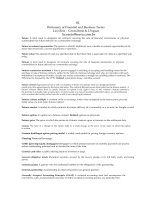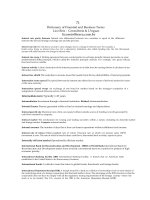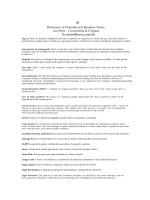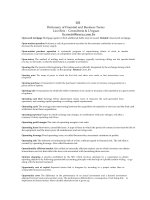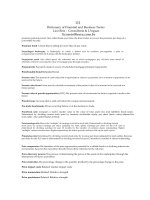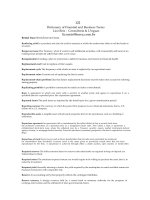business terms market leader with keys
Bạn đang xem bản rút gọn của tài liệu. Xem và tải ngay bản đầy đủ của tài liệu tại đây (66.24 KB, 4 trang )
MARKET LEADER- BUSINESS TERMS
Terms
Definitions
The name given to a product by the company that makes it
Using an existing name on another type of product
The ideas and beliefs people have about a brand
The tendency to always buy a particular brand
How familiar people are with a brand
The set of products made by a company
The use of a well-known person to advertise products
When products are used in films or TV programmes
The introduction of a product to the market
The length of time people continue to buy a product
Money risked when a business owns part of another company
Money owned by one person or organization to another person or organization
A period of time when business activity decreases because the economy is doing
badly.
Difference between the selling price of a product or service and the cost of
producing it
A place where company shares are bought and sold.
Money which people o organizations put into a business to make a profit.
Equal parts into which the capital or ownership of a company is divided.
A company’s profits divided by the number of its shares
A part of the profits of a company paid to the owners of shares.
A description of what is likely to happen in the future.
The amount of money which a business obtains (in a year) from customers by
selling goods or services.
When a person or organization is unable to pay their debts.
The money a business makes before payment to the government
The profit that a company makes in a particular period of time
A financial market in which prices are falling
The capital that a company has from shares rather than from loans
The people who own shares in a business
A situation in which goods come into and out of a country without any controls
or taxes
Taxes on imported goods
Financial aid such as cash grant provided by a government to maintain the
income of the producers of strategic products
Limit of the quantity that must not be exceeded
Exporting goods at prices lower than the home market prices
The act of giving some of the power of a central organization to smaller parts
The freedom of an organization to govern itself independently
A building where large quantities of goods are stored
The main office or building of a company
An office in which a large number of people work using telephone, for example
taking customers’ orders and answering questions
Business company that is owned or controlled by another larger company
A place through which products are sold
A marketing strategy that focuses on spreading information and opinions about
products or services from person to person using unconventional means such as
the Internet or email.
MARKET LEADER- BUSINESS TERMS (key)
Terms
Definitions
Brand name
The name given to a product by the company that makes it
Brand stretching
Using an existing name on another type of product
Brand image
The ideas and beliefs people have about a brand
Brand loyalty
The tendency to always buy a particular brand
Brand awareness
How familiar people are with a brand
Product range
The set of products made by a company
Product
The use of a well-known person to advertise products
endorsement
Product placement When products are used in films or TV programmes
Product launch
The introduction of a product to the market
Product lifecycle
The length of time people continue to buy a product
Equity stake
Money risked when a business owns part of another company
Debt
Money owned by one person or organization to another person or organization
Recession
Stock market
A period of time when business activity decreases because the economy is doing
badly.
Difference between the selling price of a product or service and the cost of
producing it
A place where company shares are bought and sold.
Investment
Money which people o organizations put into a business to make a profit.
Shares
Equal parts into which the capital or ownership of a company is divided.
Profit margin
Earnings
shares
Dividend
per A company’s profits divided by the number of its shares
A part of the profits of a company paid to the owners of shares.
Forecast
A description of what is likely to happen in the future.
Annual turnover
The amount of money which a business obtains (in a year) from customers by
selling goods or services.
When a person or organization is unable to pay their debts.
Bankruptcy
Pre-tax profits
The money a business makes before payment to the government
Earnings
The profit that a company makes in a particular period of time
A bear market
A financial market in which prices are falling
Equity
The capital that a company has from shares rather than from loans
Shareholders
The people who own shares in a business
Free trade
A situation in which goods come into and out of a country without any controls
or taxes
Taxes on imported goods
Tariff
Subsidy
Quota
Financial aid such as cash grant provided by a government to maintain the
income of the producers of strategic products
Limit of the quantity that must not be exceeded
dumping
Exporting goods at prices lower than the home market prices
Decentralization
The act of giving some of the power of a central organization to smaller parts
Autonomy
The freedom of an organization to govern itself independently
Warehouse
A building where large quantities of goods are stored
Headquarters
The main office or building of a company
Call center
Subsidiary
An office in which a large number of people work using telephone, for example
taking customers’ orders and answering questions
Business company that is owned or controlled by another larger company
Outlet
A place through which products are sold
Viral advertising
A marketing strategy that focuses on spreading information and opinions about
products or services from person to person using unconventional means such as
the Internet or email.




